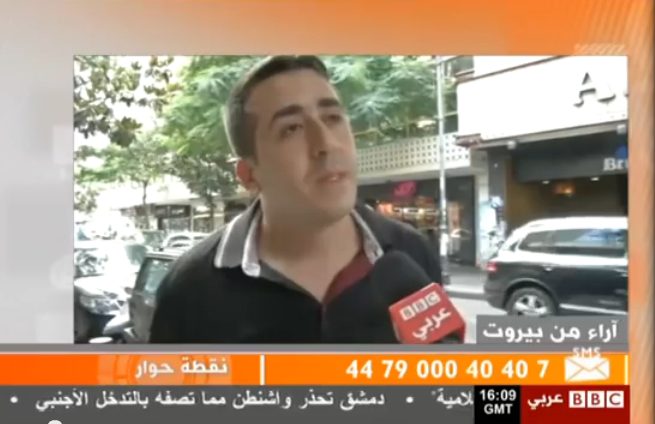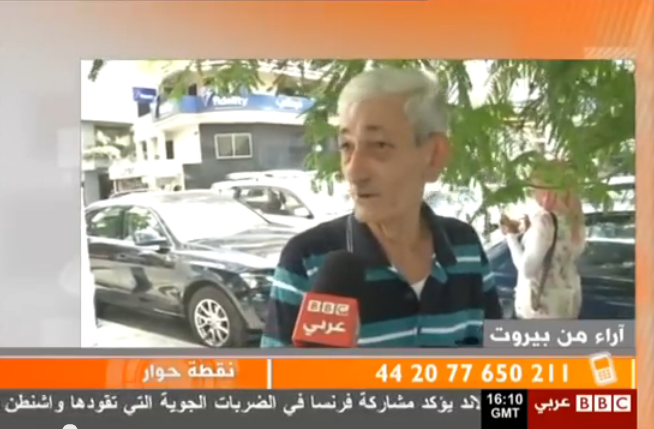The show started by reading out some comments people had posted on Facebook:
One person wrote: Da-esh is dangerous for the whole world, not just Iraq and Syria, so I support military strikes, with or without UN approval.
And another person wrote: these strikes are just going to kill Syrian soldiers and make Arabs weaker.
Then, the BBC Arabic took their camera around the streets of Beirut, Lebanon, and asked random people what they think.
This man said: Yes, I support the strikes, with or without UN approval, especially after what happened to our soldiers. (Apparently, Da-esh has beheaded a couple of Lebanese soldiers.)
Without Syrian approval, it's wrong, says this man.
They have to hit Da-esh, says this man. Whether for the sake of the people of Lebanon or Syrian soldiers, hit them, hit them!
This super-annoying lady, with a super-annoying way of talking, said in a slurred, drawling way: of coooouuuurse not. Someone coming into your house without permission. Would you allow it? (swings her purse violently.)
100% yes I agree with the strikes, because they [Da-esh] are criminals.
Strike them? Of course! Not just in Syria, but in Lebanon and Iraq, wherever they are.
No! Because this is an attack on Syria, not on Da-esh. They need Syria's approval first.
Today you hit Da-esh and tomorrow you strike Syria herself, and there's no limits.
I support striking Da-esh in Syria because it's a terrorist organization, with or without Syria's approval.
After that stroll through Beirut, we returned to the BBC Arabic studio in London where the moderator, Resha Qandeel, was taking calls. First she spoke to Abdullah, a Syrian man living in the UAE.
Abdullah started by saying: the US had a red line over the use of chemical weapons, in which many women and children died.
That was where he started. Before I knew it, he was talking about Oman and Iran. I'm not sure how he ended up there. But he concluded by saying:
The US just wants to arm the Shias against the Sunnis in Syria. American planes operated just the other day in a conspiracy with Hezbollah, and you all don't report that news. They are conspiring with the Shias in Syria. I ask you all to be honest! I ask you one thing only: why is Hezbollah not on the listed groups of terrorists!? Why is it just Da-esh and Jebhet el Nusra!? It's not just the beheadings and the killings that is terrorism! The media is also terrorists! The killers are terrorists! The silence is terrorism!
BBC Arabic Reporter reacts to Abdullah: the US wants to arm the Shias against the Sunnis!
Next, Resha talked with Aziz Kathem from Britian. He said: I think the US involvement came too late. Because the crisis has been going on for a long time.
Resha asked a question to her callers: many Arabs think that the US had a role in creating Al Qaida, a a role in creating Da-esh, and therefore is reaping what it's sown, and thus that the US should take the primary role in defeating Da-esh, although with the help of Arab countries. What do you think?
Mohamed Gherbi answered. He said: look, I'm against any foreign involvement in Arab affairs. The whole world is saying that these extremist groups are supported by the US, were created by the US, the foreign minister of the US Hilary Clinton said that yes, we made Da-esh. I call upon the US and the western countries to stop supporting these extreme groups with money and arms.
Resha: yes, but you know, what you're suggesting is that Da-esh is purely a business, and that they just need money and weapons to keep going. However, many of the fighters in Da-esh are not fighting because they get paid and such, they are fighting because they believe in a cause. So even if monetary support was withdrawn, that would not stop them from fighting.
Mohamed Gherbi: But these groups are actually benefiting the US. Because the US wants the Arab world to be ruined.
Gherbi: all the Arab countries now supporting American strikes against Da-esh are the same ones who also supported the strikes against Iraq and the destruction of Iraq.
Resha: but it's also in the interests of the US to have a stable Middle-East, and I say 'stable' between quotation marks because this is a concept that varies widely in its meaning between the US and how Arabs see it. What is the benefit to the US if the Middle East is taken over by extremist groups?
Gherbi: no, no, the US does not want any stability (Resha nods her head) because it really just wants the collapse of the Arab world and its soldiers and people and civilization. It wants the Arab world to be weak, and it wants to be the hegemony, the only power in the region. And it wants Israel to stay occupying Palestine! Now, the US wants Syria to be weaker and weaker. They don't care whether Bashar stays or not, but they just want Syria to get weaker and weaker and for its soldiers to get weaker, too.
Next, Resha turned to a professor at the National Defense College in Washington, DC, and had a little interview with him. His name was Walid Faris.
Faris: the US has no other choice. Da-esh is completely dangerous for the US, and it's dangerous for the region, too. It's not a question of having a business or cooperation with terrorist organizations.
Resha: look, the US armed fighters in Afghanistan. Then the US said that Iraq was a threat, and attacked it without legal world approval through the UN. Now the US says we have to strike Syria, even though so far Russia and China have opposed this and it's pretty certain that they will continue to oppose this in the Security Council. So, should the US still talk about striking Syria in light of their previous non-approved experiences?
Faris: actually, it's different, because we are talking about an organization, Da-esh, that is a threat to each of the five countries on the UN Security Council, and in Russia's case, some of these fighters may end up in Chechnya. Right now the coalition against Da-esh consists of the world powers and the Arab countries, and this is what Obama will lean upon as he makes his case.
That was only 19 minutes out of 51 total minutes, but it started getting boring.
But if you want to watch the whole show, do so by clicking on the YouTube link here.










No comments:
Post a Comment